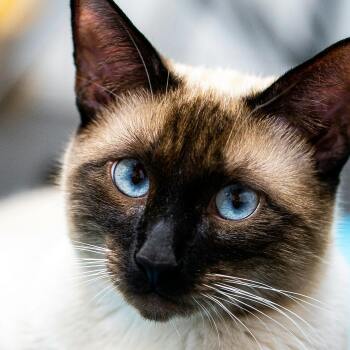Siamese

If your home includes a Siamese, then you already know—life just got a lot louder, smarter, and more entertaining. These cats are as known for their striking blue eyes as they are for their endless commentary. Whether they’re telling you about their day or giving their opinion on yours, Siamese cats bring personality in spades.
Why They're Everyone's Favorite (And They Know It)
Siamese cats are sociable, vocal, and clever to the core. They crave human interaction and often form strong bonds with their families. They're fantastic companions for kids and other pets, and they’ll follow you from room to room like a loyal shadow. Want a cuddle buddy who doubles as your personal assistant? You’ve found your match.
Their sleek, short coat is easy to care for—no high-maintenance grooming routines here. And their intelligence? Off the charts. Siamese cats can learn tricks, open cabinets, and even play games like fetch.
A Few Quirks That Come With the Territory
These confident cats are not shy about voicing their opinions. If something's out of place—or they feel like being dramatic—you'll hear about it. Siamese cats thrive on attention, and solitude just isn’t their style. Without enough interaction, they can become anxious or even destructive.
So, is all this sass and smarts worth it? For those lucky enough to live with a Siamese, the answer is always yes.
A Storied Past
Hailing from Thailand (once known as Siam), this ancient breed has been turning heads since the 1800s. Revered in their homeland and adored around the world, Siamese cats were once considered royal companions. And honestly, they still act like it. Their elegance, curiosity, and loyalty make them unforgettable additions to any household.
Genetic Predispositions in Siamese Cats
- Feline Amyloidosis— This condition causes abnormal proteins (amyloids) to build up in organs like the liver, kidneys, and pancreas. Over time, this can lead to organ failure. There’s no cure, but early diagnosis through bloodwork or biopsy allows for supportive care and monitoring.
- Megaesophagus— In Siamese cats, an enlarged esophagus can disrupt the normal flow of food to the stomach. Symptoms include regurgitation and weight loss. Special feeding positions and diet changes often help manage the condition.
- Cancer Risk— Siamese cats have a higher-than-average risk for certain cancers. Routine checkups and early detection are critical. Among the most common:
-
Lymphoma– Affects the immune system and often responds well to chemotherapy.
-
Thymoma– A rare tumor found in younger Siamese cats; treatable with surgery and medication.
-
Mast Cell Tumors– Can look like harmless skin lumps; early removal is key.
-
Adenocarcinoma– A serious intestinal cancer that may block digestion. Surgical treatment is often required.
-
- Feline Hyperesthesia Syndrome— This neurological condition causes extreme skin sensitivity and odd behaviors like tail chasing or biting at the back. It may be triggered by stress or underlying medical conditions, and treatment usually includes environmental management and medication.
- Eye Conditions: Strabismus & Nystagmus— Siamese cats are known for crossed eyes (strabismus) and occasional side-to-side eye movement (nystagmus). While these may look unusual, they’re common in the breed and don’t typically impact vision or quality of life.
- Progressive Retinal Atrophy (PRA)— A hereditary condition that leads to blindness over time. The first signs often show up as night blindness. Genetic testing of breeding cats can help reduce the risk of this disease in future generations.
- Feline Asthma— Siamese cats can be prone to respiratory issues like asthma, which inflames the small airways in the lungs. Symptoms include wheezing and coughing, often mistaken for hairballs. Inhalers and oral medications can provide relief and improve quality of life.
- Wool Sucking Behavior— This breed is also known for suckling on blankets or clothing—typically a self-soothing behavior. It’s generally harmless but worth monitoring to make sure it doesn’t escalate into pica (eating non-food items).
- Separation Anxiety— Highly bonded to their humans, Siamese cats can experience significant anxiety when left alone for long periods. Signs include vocalization, inappropriate elimination, and destructive behavior. Mental stimulation, interactive toys, and sometimes medication can help manage the condition.
Ready to Learn More? We’re Here to Help!


